Keeping Ibaloy history and heritage alive
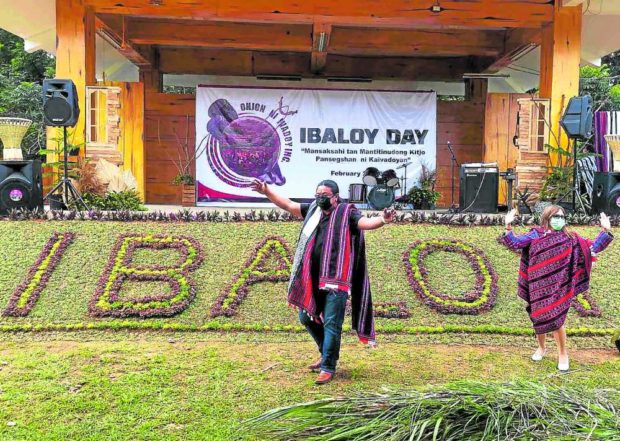
CELEBRATION | The sound of beating gongs and native drums signal Ibaloy to step up and perform the “tayaw,” a celebratory communal dance during gatherings like the Feb. 23 Ibaloy Day at Baguio City’s Burnham Park. (Photo by EV ESPIRITU / Inquirer Northern Luzon)
BAGUIO CITY, Benguet, Philippines — The sound from the beating of gongs was subdued when members of Ibaloy clans in Baguio City gathered at Burnham Park’s Ibaloy Heritage Garden for the 13th Ibaloy Day on Feb. 23.
For many of the participants, it was their first time to reunite since the COVID-19 pandemic was declared in 2020.
Few children and the elderly were in attendance. Those who came had to settle for fist bumps instead of long hugs to greet each other and kept their face masks on when they joined the “tayaw,” a communal celebratory dance.
It would also have been an opportune time to campaign when Ibaloy candidates for Baguio and the larger Benguet community, including nominees of party list groups representing indigenous peoples, turned up at the gathering.
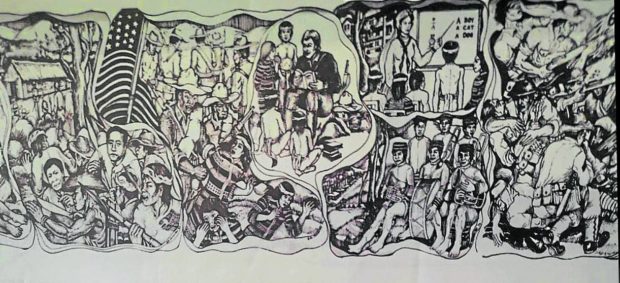
PRESERVING CULTURE | The late Ibaloy historian Geoffrey Carantes taught people about the Ibaloy of Baguio and Benguet through pen and ink illustrations of their rituals, traditional garments and their history. His work was on display at this year’s Ibaloy Day. (Photo by EV ESPIRITU / Inquirer Northern Luzon)
But the candidates huddled with friends instead of launching into political discussions.
Article continues after this advertisementFor centuries, the Ibaloy selected leaders “who can protect the tribe, its properties and resources,” so politics has always been part of life for generations of the city’s original settlers, said Andrew “Bobby” Carantes, a humanities professor at the Philippine Military Academy.
Article continues after this advertisementIn the early 1900s when the Americans came, “we learned to use political activism to get respect for our indigenous communities and to secure full recognition of our ancestral lands,” he said.
The Carantes siblings are direct descendants of Maximino Carantes, a son of Mateo “Kustacio” Carantes, who served with Gen. Emilio Aguinaldo during the Philippine-American War. Kustacio was later appointed president of the Igorot advisory council that was formed in Baguio.
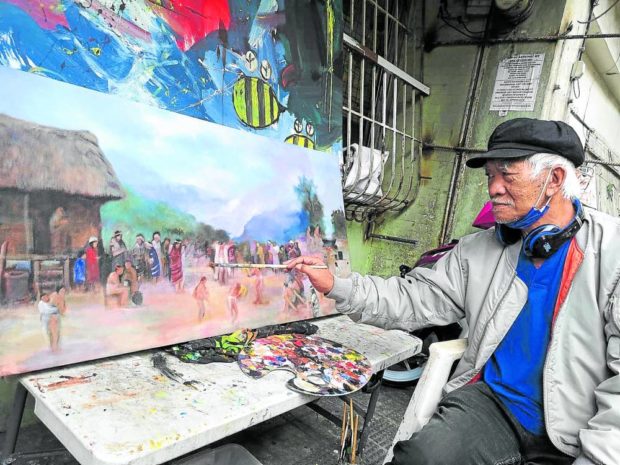
BENGUET LIFE | Baguio City-based artist Roland Bay-an translates into canvas scenes from the daily lives, rituals, and traditions of the hardy Ibaloy that he witnessed as he was growing up. (Photo by EV ESPIRITU / Inquirer Northern Luzon)
‘Rock stars’
Bobby and brothers Adon and Reuel are musicians, having formed the ethnic rock band Bag-iw in 1978 with sister and bass player Leah.
Their song, “Tell Me Through My Dreams,” was a hit and was frequently played by Metro Manila radio stations in the 1990s, but some of the original band members had left and new performers unrelated to the Carantes family had kept the band alive.
Now in their late 50s and early 60s, these “lolo (grandpa) rockers” have reunited, this time to give voice to the unresolved issues plaguing the Ibaloy, Bobby said at the sidelines of the event, which was also a celebration of the International Day of the Native Title.
The Native Title refers to the Feb. 23, 1909, United States Supreme Court ruling that recognized the native rights of Ibaloy chieftain Mateo Cariño over cattle lands, which were expropriated by the American military in 1903.
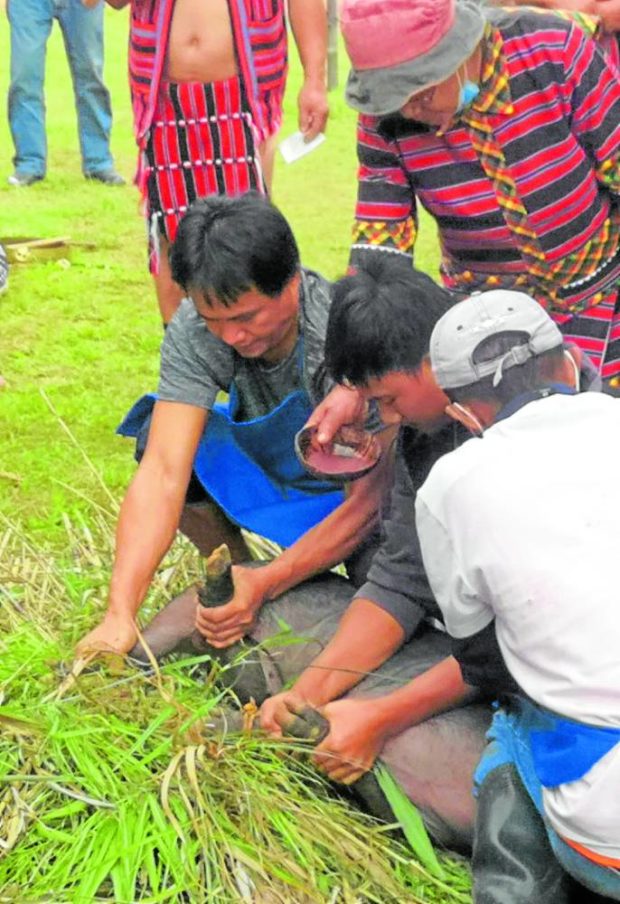
COMMUNITY’S FUTURE | The future is divined by an Ibaloy elder after a pig is butchered in a ritual and its meat turned into a meal that is shared by the community during the Ibaloy Day celebration in Baguio early this week. (Photo by EV ESPIRITU / Inquirer Northern Luzon)
In that same year, the American colonial government established the chartered city of Baguio which was designed and built as a hill station and the seat of government during the summer.
The Cariño decision has been called the Native Title Doctrine and is often cited in judicial rulings across the world. It is one of the foundations for constitutional provisions that recognize indigenous peoples’ rights, as well as Republic Act No. 8371, or the 1997 Indigenous Peoples’ Rights Act.
But even in modern times, Ibaloy “are still a minority,” who are impacted by “cultural conquest, economic marginalization, and social exclusion,” said Baguio Councilor Isabelo Cosalan, an Ibaloy who sponsored the 2013 ordinance designating Feb. 23 as Ibaloy Day.
Lands lost
He said Ibaloy families lost more land when they were pushed to Baguio’s peripheries as the city became populated and developed.
For present-day Baguio generations, the names of streets and places represent Ibaloy legacy, such as Carantes Street and Camdas Subdivision, which is named after one of Baguio’s first inhabitants.
“But we continue to exist. We thrive because we go back to our roots. We value our language. We value our culture,” Cosalan said.
According to Bobby, Ibaloy roots are tied to their ancestral lands that are part of their history, which is why Ibaloy descendants have fought hard for them in Baguio.
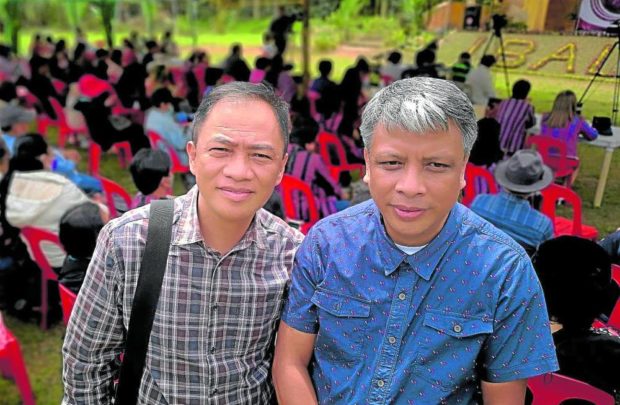
ADVOCATES | The Carantes siblings Bobby, 62 (left), and Adon, 56, used to perform as ethnic rock band Bag-iw alongside brother Reuel, or “Owat,” 64 (not in photo). The brothers have since become vocal advocates for indigenous peoples rights. (Photo by EV ESPIRITU / Inquirer Northern Luzon)
The Carantes brothers are battling a lawsuit filed by the Bases Conversion and Development Authority, which seeks to nullify all certificates of ancestral land titles issued within Camp John Hay territory.
Camp John Hay was also the subject of the landmark US high court decision which favored Cariño.
Bobby said the Baguio Ibaloy had not been given a level playing field to assert their rights.
At a press briefing on Feb. 1, the Carantes brothers questioned a 2020 agreement to relocate the Baguio Justice Hall to a 10,000-square-meter lot inside Camp John Hay, which he said “betrays a conflict of interest.”
Since the 1900s, Ibaloy have generally been treated like American Indians, according to the late Ibaloy historian Geoffrey Carantes, an uncle of the Bag-iw founders.
A popular illustrator, whose drawings were the basis for the bas relief at the Benguet provincial capitol, Geoffrey’s work was put on display by his daughter, theater director Lynette Bibal, during the Ibaloy Day program to remind local families of their history and heritage.
RELATED STORIES
Baguio City marks 9th Ibaloy Day with parade, rituals
NCIP secures Ibaloy lands vs legal threats